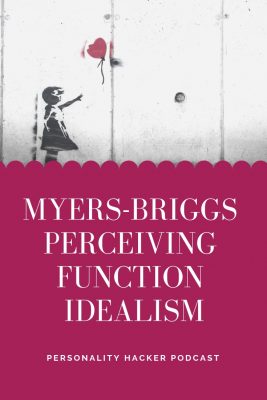Download Episode Here – right click link and select “Save Link As…”
In this episode, Joel and Antonia talk about the idealism we develop around our perceiving cognitive functions.
In this podcast you’ll find:
- In the last podcast, we discussed idealism with the four judging functions
- Car Model
- ENTP/ENFP share the same dominant perceiving function – Extraverted Intuition ‘Exploration’ Ne
- Exploration = endless freedom
- Always chasing a new shiny object
- Hard to commit to anything
- EPs want to keep their options open at all times
- Purity without having to do any work to gain true mastery
- ENFPs are better at pretending they are following the rules
- ENTPs struggle with this because of their Ti – Introverted Thinking
- ENFPs are good at pretending intimacy with people
- They don’t like saying yes to things they may feel trapped by later
- Ne wants to create impact in the world.
- It wants to see if there is a better way.
- You can’t create a new norm unless you disrupt what is already there and establish something else.
- The polar opposite of Extraverted Intuition is Introverted Sensing ‘Memory’ – Si
- Memory = reviewing memories to get impressions
- The Ideal for Si is purity for all memories.
- Many ISJs spend massive amounts of time on detailed creative hobbies that allow them to shut out the world and its many disruptions.
- ENPs with an inferior Si can choose not to think about the things they don’t want to deal with. Like past trauma.
- When memories start to come up for SJs they don’t have the choice just to push it away as NPs do.
- Reviewing sensory experiences is a compulsion for SJs. To not do so causes depression.
- So they hide or stick to reliable routines.
- Tried and True vs. Hiding from the world
- Ne compulsion is perpetually bouncing from one thing to the other
- Ne requires a foundation to build upon
- Si requires surrender to change
- SJs do pattern recognition work, but it is slow because they have to repattern a whole memory
- Extraverted Sensing ‘Sensation’ Se
- The idealism for Se is an oversimplified version of everything
- “There’s an obvious and simple solution for everything; why aren’t we doing it?”
- Sometimes the obvious solution is the right one. Sometimes it isn’t.
- Se sees no need to study systems or think of complexities.
- The world is full of immediate, actionable solutions that everyone else is too obtuse to see.
- Purity without the work
- Everybody else is the idiot
- This is why they are so good at reacting in real time
- Ne never has to commit
- Si never has to do anything out of its comfort zone
- Se never has to figure out the complexity of things behind the curtain
- “When you have a hammer all the world is a nail.”
- There is a percentage of problems that people do overcomplicate – but not all of them.
- ESPs are always in trouble because they try to simplify problems that require more complex answers.
- Se is the polar opposite of Introverted Intuition ‘Perspectives’ Ni
- Ni gets into other people’s perspectives
- Se worries about what people think of them
- As long as Se can get people on its side, it doesn’t have to think about managing their goodwill
- Se needs to surrender to the idea that there is no such thing as a pure function.
- They have to do the Work.
- Se needs to remember that some problems are more complicated than they think.
- As Se gets more seasoned and mature over time, it starts to recognize the law of diminishing returns on simple solutions.
- Introverted Intuition ‘Perspectives’ Ni
- The ability to shift perspectives and get into other people’s headspace
- They also watch their own mind form patterns
- Ni gets gummed up by sustainability
- Ni can go so long term that they prevent new experiences from happening if it doesn’t look sustainable
- Ni fantasy is the idea that reality can be lived internally before it happens.
- You can have all the answers just by running a simulation
- That sounds like a lot of work to other people, but it is the native language of INJs.
- The work is being present and implementing real time.
- Sjs hide away. NJs conceptualize.
- INTJ who couldn’t stop talking because he was externalizing his inner dialogue at all times – and none of it made sense to anyone but him.
- Stream of consciousness talk
- If he could figure it all out, he could accomplish his dream to be a contributor – showing up in life and engaging.
- Balance it out and engage with the hear and now.
- Get away from purist thought and get into the work.
- Don’t just run a simulation but look for the evidence in front of you, not just the patterns in your mind.
- What is the sensory evidence? How do people see you?
- INJs are all steak and no sizzle, but nobody comes to them for the steak because there’s no sizzle.
- There’s no ability to interface with the world to bring complex solution to complex problems.
- There’s no bridge.
- They are just chasing rabbit trails internally.
- They think the rabbit trails will equate to impact.
- All four perceiving functions have this desire for excellent ROI without having to put in the work.
- Work you need to do:
- Integrate the other side of the polarity and recognize its influence
- Attach your perceiving function to the other functions in your stack – especially functions of the opposite attitude (E/I)
- Recognize you have to do the work. You can’t just exist and be amazing.
- The antidote is the integration of the other side of your polarity.
- Integration = understanding the importance of something and not pushing it away anymore
- If an introverted function has you by the balls, integrate an extraverted function – either the polar opposite or the copilot.
To subscribe to the podcast, please use the links below:
Subscribe with iTunes
Non-iTunes Link
Download The Android App
Subscribe on Soundcloud
Subscribe with Stitcher
Subscribe on Google Play
Subscribe with Facebook Messenger
If you like the podcast and want to help us out in return, please leave an honest rating and review on iTunes by clicking here. It will help the show and its ranking in iTunes immensely! We would be eternally grateful!
Want to learn more?
Discover Your Personal Genius
We want to hear from you. Leave your comments below…



Share:
Podcast - Episode 0265 - Myers-Briggs Judging Function Idealism
Podcast - Episode 0267 - Using The Enneagram For Personal Growth (with Beatrice Chestnut)
32 comments
[INFJ woman] I was absolutely FLOORED by Antonia’s story about her INTJ friend, because I’m very similar in the absolutely massive amounts of information I take in. However, I wonder if the difference in the Ni-Te and Ni-Fe stacking point to the small differences here. While it seems the INTJ was mostly interested in fantasy, comics, etc., I find I take in a ton of nonfiction, sociology, news, and such.
This could easily point to the Ni-Fi and Ni-Ti loops, because I feel like if I just have enough information I can solve It, whatever “It” is. I’ve found that the best way to overcome this is to use my Fe strength to facilitate complex conversation. I absolutely thrive in group therapy and philosophy/theology discussions, and have previously acted as a mediator in a variety of situations, using my Fe-Ti polarity to bridge communication gaps.
It would be cool if any other Fe users could share their experiences! These are some serious growth spaces for me, and I’d love to know how to put myself in conducive environments :)
Hi, I have a question about the difference between ISJs and INJs. I understood that one of the differences in the way that ISJs and INJs hide is that ISJs do so in order to avoid having to deal with bad memories and INJs do so because they are already certain about how something is going to work out – so they don’t need to go through the experience. I’m wondering how it works for INJs when they do not feel that they have enough information to future pace accurately?
I identify with INFJ more so than ISFJ, especially when it comes to meeting people – I can get to 10, 20 years down the line very easily and feel like I know what the problems may be, and I’m usually right about it. I also relate a lot to being able to see things easily from another person’s perspective. But, there are other situations, with my new business for example, where I feel like I do not always have enough information to future pace accurately. My go-to in those situations is to hold off making any moves until we have gathered enough information to make an informed, ethical decision, because I do not want for myself or my business to be responsible for having caused negative long-term impact. That seems similar to how ISJs may hold off taking part in new experiences because they are unsure of how it will turn out and do not want to process bad memories…. so, I am wondering how the two functions (Introverted Intuition and Introverted Sensing) are different in those situations – where there isn’t enough information for accurate future pacing?